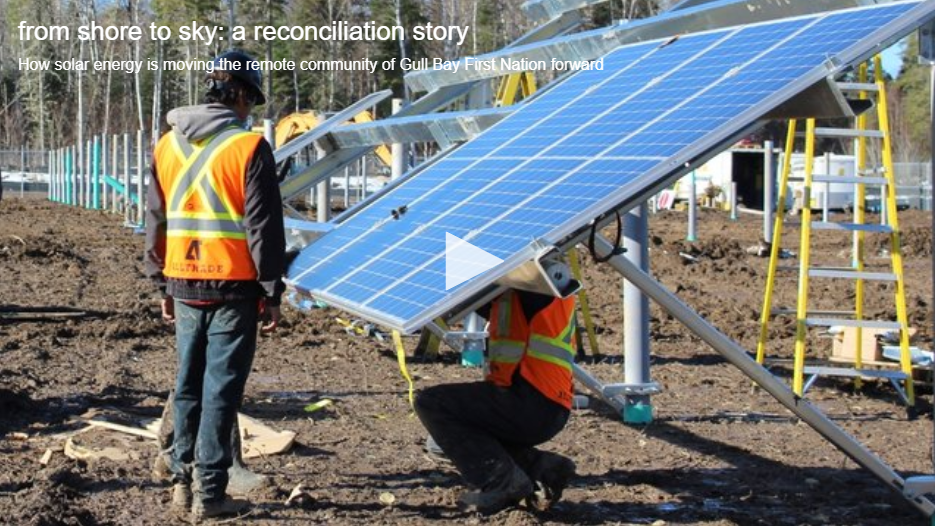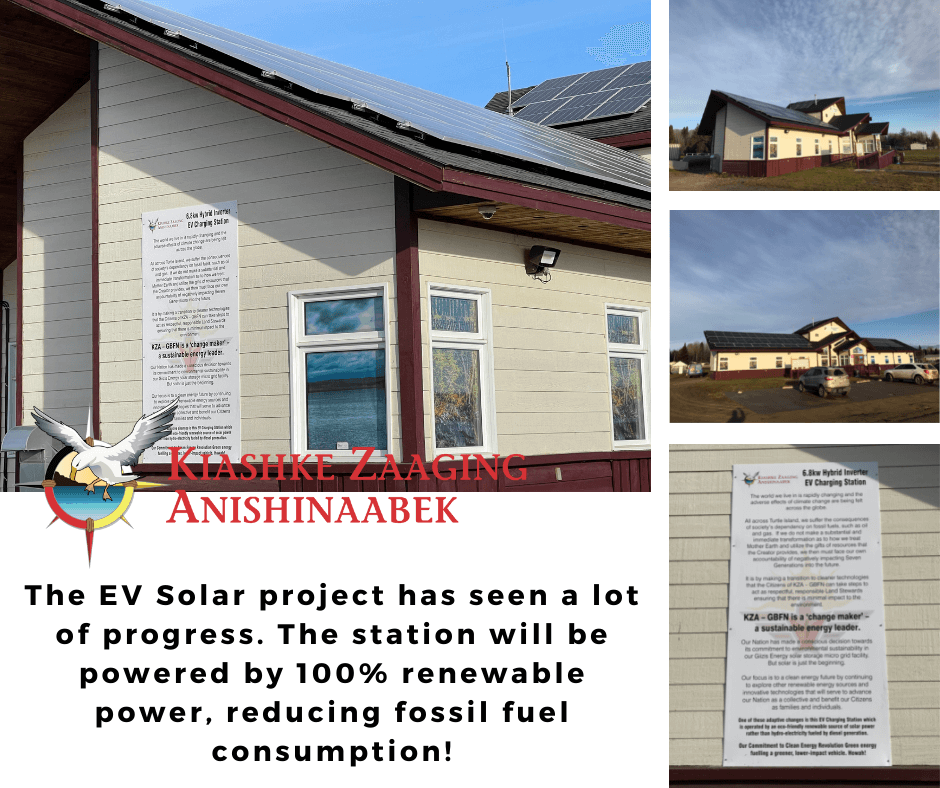Mashkawiziiwin Energy
Past Mashkawiziiwin Energy News and Updates
No new News or Updates. Check back regularly to keep up to date!

About Mashkawiziiwin Energy
Canada’s Game Changer: Off-grid diesel reduction to energy sovereignty
The Gull Bay First Nation Micro Grid Project will be Canada’s FIRST fully-integrated remote renewable energy-storage micro grid! The Micro Grid project is showcasing innovative technology and integration with its combination of solar photovoltaic power, battery energy storage, and a micro grid controller connecting to the existing Hydro One Remotes diesel generating station to provide clean solar power and off-set diesel use. Switching from diesel to solar power in a seemingly smooth transition with the integration of lithium-ion battery energy storage micro grid technology. When the sun is shining, the Community will be powered by Sun and the diesel generators will switch off reducing approximately 110,000 litres or 25% if diesel fuel a year.
Coordinated through an Indigenous Clean Energy Planning (ICEP) Process, directed by Chief and Council, with the support of the Mashkawiziiwin Energy Projects Team and Lumos Energy, Ontario Power Generation (OPG) are GBFN’s project development partners and have procured Alltrade Industrial as the general contractor and constructor for the Project. Other collaborators include Hydro One Remote Community Inc. (Remotes), MaRS Advances Energy Center, ABB Inc., and DNV GL (Alltrade’s Engineer).
The project cost is approximately $8-9 Million dollars and will receive funding support from various government and private sources to offset project costs including; Ontario Smart Grid Fund, Northern Ontario Heritage Fund, Energy Partnerships Program, and the LDC Tomorrow Fund.
This project is a source of pride for Gull Bay First Nation knowing their future will be cleaner and the Next Generations will have clean energy technology in their home.
KZA-GBFN’s primary will remain diesel UNTIL enough different green energy sources exceed the current diesel generation stations capacity output.
KZA-GBFN Energy News
Frequently Asked Questions
The Project involves a micro grid controller that integrates energy production from solar panels and a battery energy storage system with the existing diesel distribution system. The micro grid controller will balance generation and energy storage to reduce diesel use in the community.
- Coordinated through an Indigenous Community Energy Planning (ICEP) process, directed by Chief and Council, with the support of the Mashkawiziiwin Energy Projects Coordinator and Lumos energy, KZA’s energy advisor
- OPG will act as development partner for the Project, along with the support of various technical firms
- KZA’s development corporation Ma’iingan Development Inc. (MDI) is expected to own the micro grid Project once it is complete and operational
Parties collaborating together who are providing in-kind contributions include;
- Hydro One Remote Community Inc. (Remotes)
- MaRS Advanced Energy Center
- ABB Inc.
- DNV GL (Owner’s Engineer)
- Alltrade (General Contractor)
The Minister of Energy directed the IESO to explore diesel offsetting generating opportunities in collaboration remote First Nation communities, including KZA, which is not expected to be connected to the broader Ontario grid. Reducing diesel dependence is aligned with Ministry of Energy policy, Ontario’s Long Term Energy Plan and Climate Change Mitigation Policy.
The Project will be receiving funding support from various government and private sources to offset Project costs including; Ontario Smart Grid Fund, Northern Ontario Heritage Fund, Energy Partnerships Program and the LDC Tomorrow Fund.
Expected cost is approximately $8-9 million dollars.
- Generate clean, renewable energy from solar panel
- Reduce diesel fuel used by existing diesel generators by up to 25% or 120,000 L annually
- Lower CO2 emissions annually
- Gain valuable business experience developing clean energy solutions
- Earn ongoing revenues will offset the costs to run and maintain the micro grid
- Provide services and opportunities for interested and qualified KZA businesses and members to seek subcontracts or employment with the general contractor
- Jobs include: tree clearing, fencing, site prep, solar panel racking installation, excavation, maintenance requirements for solar and battery components during operations
- MDI and OPG will work on procurement and construction plans
No, electricity rates will not be affected. MDI will be paid for the renewable clean energy that the micro grid delivers to the KZA community. After paying operating costs, MDI, which is wholly owned by KZA, can use profits to benefit the community.
The project worked with INAC to secure a permit to access lands to develop and construct the micro grid Project. KZA Chief and Council have signed a band council resolution to authorize the Minister to issue a permit on behalf of KZA.
An environmental assessment approval from INAC was received. The report studied: flora, fauna, species at risk, water bodies, air, noise, dust, archaeology, socioeconomics, geotech and hazardous waste management and found the project will cause no significant impacts. Environment commitments have been accepted by INAC and the Project’s general contractor.
The Project will be physically connected to the existing diesel generating station such that both systems can communicate with each other through several control interfaces.
The micro grid is expected to have a 20-year design life with regular maintenance, servicing and battery replacements.
Equipment will be checked routinely and there will be maintenance requirements for the solar panels and battery (e.g. clearing snow off panels & access roads, trouble-shooting lights, installing heating/ventilation filters, vegetation management). More extensive maintenance will be outsourced.
A Site-Specific Health and Safety Plan and Environmental Management Plan outlines preventive commitments the general contractor must follow.
Yes, KZA can expand the system after it is operational and may add more renewables later.




